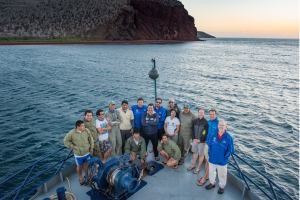
UNC researchers Scott Gifford, Harvey Seim and Adrian Marchetti as well as MS candidate Liang Zhao have recently published in Frontiers in Microbiology in a paper titled “Microbial Niche Diversification in the Galapagos Archipelago and Its response to El Niño.” This paper highlights how the Galapagos Archipelago is a natural laboratory used to identify the environmental factors that structure marine microbial communities due to the diverse oceanographic setting the archipelago is located in.
Microbes lay at the foundation of marine ecosystems. One set of microbes, phytoplankton, serve as the primary producers that make the food that sustains all other organisms. The other group of microbes, bacteria, are responsible for consuming the vast majority of that food. It is the interplay between these microbial groups that determines the amount of food and energy that reaches the higher trophic levels of marine ecosystems and supports macrofauna such as fishes, turtles, and whales. However, it has been difficult to determine how environmental conditions shape the types of microbes and their activities in marine habitats, and therefore how they influence ocean food webs. Distinct microbial communities were found around the archipelago that vary with the unique physical and chemical environmental conditions around each island. This paper demonstrates that both the marine environment and microbial communities underwent substantial shifts during the 2015/2016 El Niño event, particularly on the western end of the Archipelago.
As a result of this study, we now understand which types of microbes are dominant around the archipelago and how they respond to environmental shifts such as El Niño events, and importantly how these changes alter the flow of energy and materials that support the rich diversity of marine life in the Galapagos.
Gifford SM, Zhao L, Stemple B, et al. (2020) Microbial Niche Diversification in the Galápagos Archipelago and Its Response to El Niño. Front. Microbiol. 11:575194.
